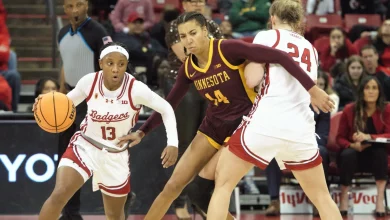According to reports, BYU basketball will host a Georgia transfer For Visit, Silas Demary Jr.

In college basketball, transfers have become a pivotal part of team building. With the advent of the NCAA Transfer Portal, teams across the country have an opportunity to strengthen their rosters by adding experienced players who can make an immediate impact. One such player is Silas Demary Jr., a transfer from the University of Georgia, who is reportedly set to visit Brigham Young University (BYU). This news has caught the attention of college basketball fans and analysts alike, as the potential addition of Demary could significantly bolster BYU’s backcourt and give the Cougars a much-needed boost for the upcoming season.
Demary, a highly regarded guard who played for Georgia, is considered one of the most intriguing prospects in the transfer portal. His decision to leave Georgia and explore opportunities at another school has raised a lot of questions about his future and the kind of impact he could have on a new program. As BYU basketball continues to evolve and build a team capable of competing at a high level, the addition of Demary could be a game-changer. This article will explore why Demary’s visit to BYU is significant, what he could bring to the Cougars’ roster, and how his potential transfer fits into BYU’s overall program strategy.
Silas Demary Jr.: A Rising Star in College Basketball
Silas Demary Jr. entered college basketball with high expectations, having earned significant praise for his play during his high school career. Originally from Charlotte, North Carolina, Demary was a standout player in his home state and quickly emerged as one of the top prospects in his class. His combination of size, skill, and basketball IQ made him an attractive recruit for several major programs, and he ultimately decided to play for the University of Georgia, where he could continue his development under the tutelage of head coach Mike White.
During his time at Georgia, Demary showed flashes of the talent that made him a coveted prospect. As a versatile guard, Demary demonstrated a knack for scoring, distributing the ball, and playing solid defense. His ability to play both on and off the ball made him an ideal fit for multiple roles, and he quickly became a key contributor to the Bulldogs’ rotation. Despite Georgia’s struggles as a program, Demary was one of the few bright spots on the team, showing that he had the skills to thrive at the next level.
Throughout his time in Athens, Demary’s game matured, and his ability to run the offense and contribute defensively earned him recognition as one of the SEC’s rising talents. However, despite his individual success, Demary ultimately decided to enter the transfer portal following a season that did not see Georgia reach its full potential. The decision to leave Georgia was likely influenced by a variety of factors, including a desire for a fresh start and the chance to play for a program with greater aspirations.
Why BYU?
For BYU, the recruitment of Silas Demary Jr. is an exciting opportunity to strengthen their backcourt and add another dynamic player to an already talented roster. BYU has consistently been one of the top programs in the West Coast Conference (WCC), but as the team continues to compete for championships and NCAA Tournament bids, adding experienced players through the transfer portal has become a crucial part of their strategy.
Demary’s decision to visit BYU is noteworthy for several reasons. First, the Cougars’ basketball program has built a strong reputation for developing talent and competing at a high level. Under head coach Mark Pope, BYU has become a competitive force in the WCC, and the team has made several deep runs in the NCAA Tournament. Pope, who took over as head coach in 2015, has revitalized the program with a focus on player development, teamwork, and a strong defensive identity. His success has attracted top recruits and transfers, and bringing in someone like Demary would only further elevate BYU’s program.
Another key factor in Demary’s decision to visit BYU could be the team’s style of play. Under Pope, BYU has run an up-tempo offense that emphasizes spacing, ball movement, and shooting, which could complement Demary’s strengths as a guard. His versatility and ability to create for himself and others make him an ideal fit for a BYU team that relies on guards to lead the offense. Additionally, BYU’s strong academic reputation and commitment to helping players succeed both on and off the court could be an attractive selling point for Demary, who is looking for the right environment to continue his growth as both a basketball player and a student.
What Silas Demary Jr. Brings to BYU
If Demary decides to transfer to BYU, he will bring a well-rounded skill set that can immediately contribute to the Cougars’ success. As a 6-foot-3 guard, Demary has the size to compete against bigger opponents in the WCC while also having the quickness and agility to guard smaller, faster players. His combination of strength and speed gives him the ability to impact both ends of the floor, making him a versatile asset for BYU’s coaching staff.
Scoring and Playmaking
One of Demary’s biggest strengths is his ability to score. While he was primarily known for his playmaking at Georgia, he also showed the ability to take over games offensively when needed. Demary is capable of scoring at all three levels—finishing at the rim, knocking down mid-range shots, and hitting three-pointers. His offensive versatility allows him to stretch the floor and keep defenses honest, which is crucial for a team that relies on floor spacing and shooting to run its offense.
In addition to his scoring, Demary is also an adept playmaker. As a point guard, he demonstrated excellent vision and decision-making, often setting up his teammates for easy baskets. His ability to create opportunities for others is an essential asset for BYU, as the Cougars look to improve their ball movement and offensive flow. Demary’s willingness to distribute the ball and facilitate offense makes him an ideal fit for BYU’s up-tempo system.
Defense
Defensively, Demary has the potential to be a standout. His size and athleticism allow him to guard multiple positions, from the point guard to the shooting guard, and his tenacity and intelligence make him a strong perimeter defender. During his time at Georgia, Demary was known for his ability to disrupt passing lanes and make life difficult for opposing guards. His versatility on defense would give BYU the ability to switch on screens and put pressure on the ball, which is crucial in a high-level program like the Cougars.
Leadership and Experience
Another important factor is Demary’s experience playing in the SEC, one of the most competitive conferences in college basketball. While at Georgia, Demary had the chance to compete against some of the best players in the country, gaining valuable experience that would translate well to the WCC. His leadership and maturity would be assets to BYU, as the team looks to contend for conference titles and NCAA Tournament appearances in the coming seasons.
The Impact on BYU’s Roster
The addition of Silas Demary Jr. would be a major boost to BYU’s roster, particularly in the backcourt. The Cougars have a solid foundation with a mix of veteran players and talented underclassmen, but adding a player of Demary’s caliber could elevate the team to new heights. With his ability to score, pass, and defend, Demary would immediately step into a starting role and become one of the team’s primary playmakers.
BYU’s backcourt would benefit greatly from Demary’s presence. The team already has talented guards like Alex Barcello (who graduated after the 2021-22 season) and other contributors, but Demary would add another dynamic weapon. His ability to both facilitate and score would give the Cougars more flexibility in their offensive schemes, making them harder to defend. Moreover, his defensive prowess would help solidify BYU’s perimeter defense, which has been an area of focus for Pope.
In terms of leadership, Demary would be joining a program that prides itself on its family-oriented culture. His experience playing in a high-profile conference and his well-rounded skill set would make him an important locker room presence. As BYU continues to develop its program and push for championships, having a player like Demary who understands the grind of major college basketball would be invaluable.









